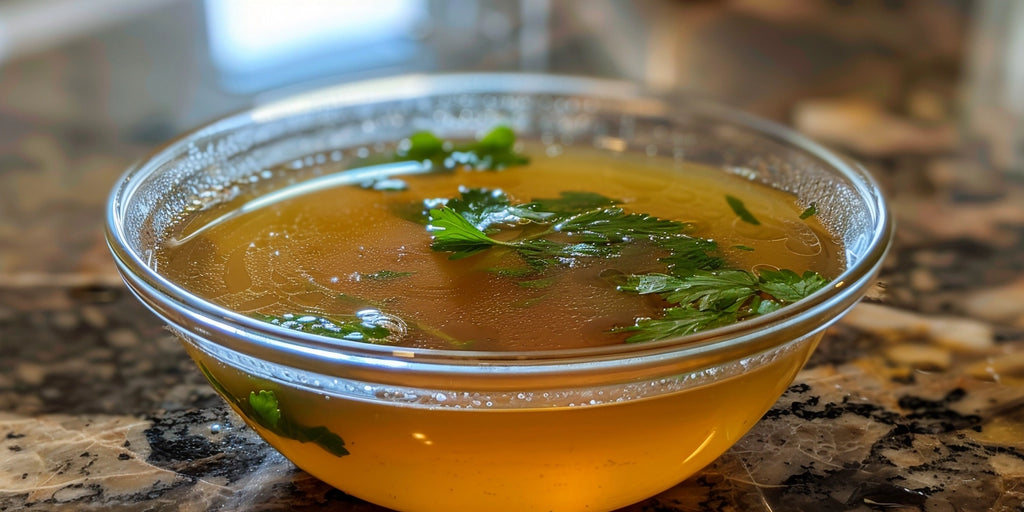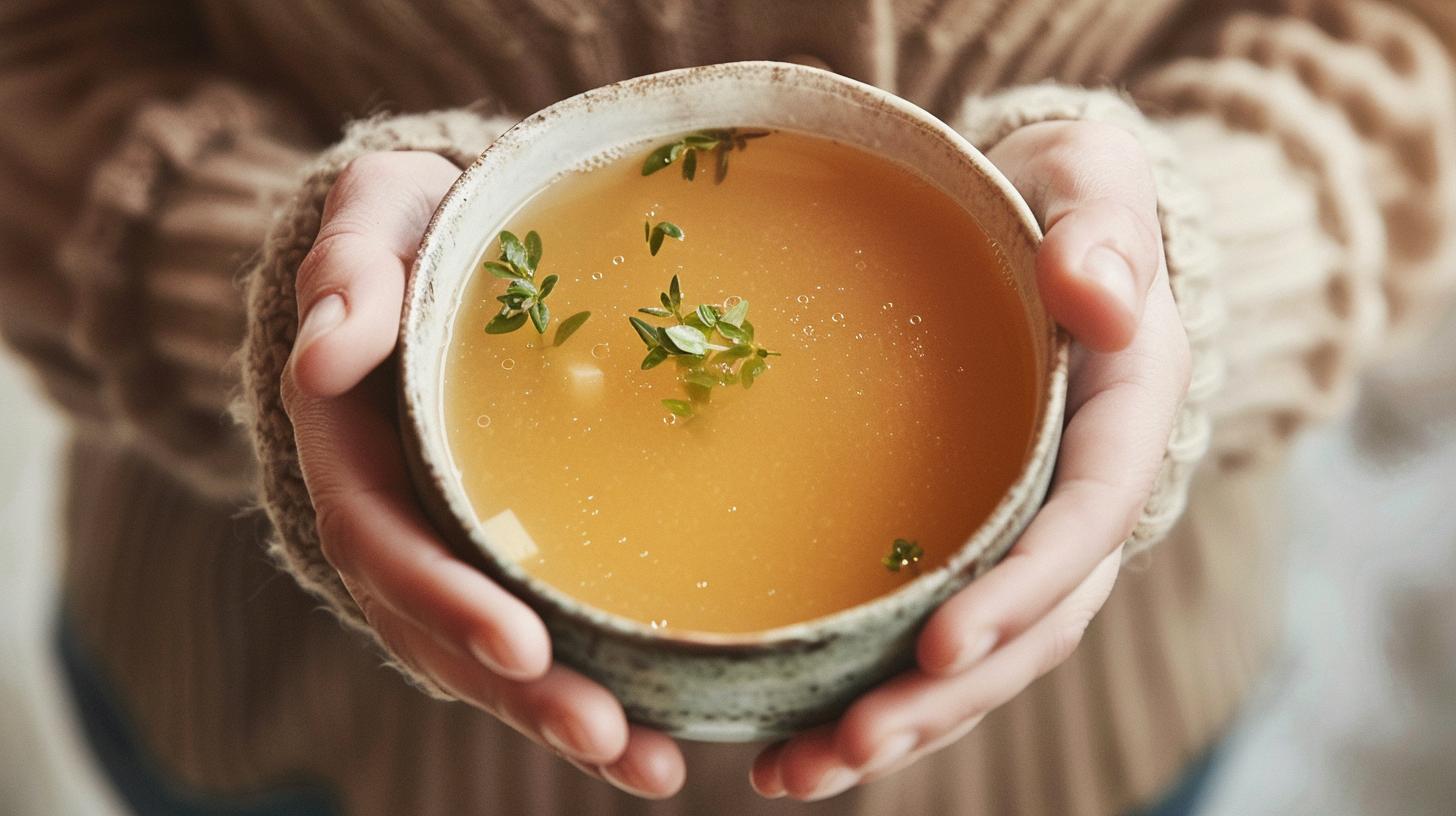When it comes to nutrient-rich, comforting foods, we can't overlook bone broth. Not only is it packed with vitamins and minerals, but it's also a fantastic source of protein, making it a go-to for many health enthusiasts. But how many calories are in bone broth?
Well, that depends on the type of bone broth you're sipping. A cup of bone broth can vary between 39 to 80 calories. If you're enjoying a cup of beef bone broth, you're looking at around 39 calories, while a cup of our bone broth delivers approximately 80 calories.
Remember, it's not just about the calories. Bone broth also offers a wealth of other health benefits, including improved digestion, reduced inflammation, and joint strengthening. So, let's dive deeper into the world of bone broth and its nutritional profile.

Understanding the Basics of Bone Broth
Bone broth is a nutritious stock obtained by simmering various parts of animals, predominantly bones with a small amount of meat stick to them. It’s an excellent source of nutrients, particularly protein delivered in the form of gelatin and an array of minerals. We boil down animal parts like knuckles, bones, marrow, feet, and sometimes even the skin and ligaments of animals where the rich collagen content lies.
Bone broth is made by boiling these parts down for extended periods, resulting in a thick, nutritious, and flavorful liquid. Adding vinegar (often apple cider vinegar) to the water aids in pulling the nutrients from the bones into the broth.
The preparation method for the broth is subjectiively variable. One can get creative with the ingredients, incorporating different flavors based on individual preferences. Chicken meat, onions, carrots, celery, parsley, thyme, garlic, salt, pepper, and other herbs may be added to the broth for personalizing flavor profiles.
Nutritional Value of Bone Broth
The precise nutrient content in bone broth can vary, depending on the type and quantity of the bones used. However, the nutritional benefits it imparts are consistently high. Animal bones are rich in calcium, magnesium, collagen, and a plethora of other minerals, all of which aid in building and strengthening our own bones.
While the exact amount varies, marrow provides vitamins A and B, along with minerals such as zinc, iron, calcium, and selenium. The protein collagen, found in these animal parts, turns into a gelatinous form when cooked and imparts several important amino acids.
The nutrition provided by bone broth is in an easily absorbable format, making it easier for the body to use effectively. A cup of this flavorful broth can range in calories from 39 to 80, offering versatility depending on the desired dietary intake.
Here’s a basic nutritional breakdown:
|
Nutrient |
Quantity per cup |
|---|---|
|
Calories |
39 - 80 |
|
Protein |
6 g – 12 g |
In a nutshell, the organic bone broth offers far more than just flavor. Its health benefits range from strengthening joints, reducing inflammation, to boosting overall immunity and enhancing digestive health. These selling points have made this superfood a core component of the bone broth diet.
Impressive isn’t it? But that’s not all. Dive deep into the following sections to discover more about the myriad health benefits of consuming bone broth.
Factors Affecting Calorie Content
Digging a bit further into what determines the caloric content of bone broth, we come across several elements that play a critical role. Among them, the ingredients deployed, the cooking method and duration, and the serving size stand out as having the most significant influences.
Ingredients Used in Bone Broth
When it comes to the bone broth diet, the calorie content can vary drastically based on the ingredients used. Animal carcass, be it chicken, beef, pork, or fish, forms the primary base. The type of bones chosen can alter the nutritional makeup. For instance, marrow bones are high in fat, hence contribute more calories, whereas bones rich in collagen like neck or foot add protein but fewer calories.
Commonly, additional ingredients like carrots, onions, and celery are also tossed into the mix, albeit their caloric contribution is minor. Keep in mind that the best bone broth is often organic, made from grass-fed or pasture-raised animals. That's because organic, free-range animal bones tend to have a healthier nutritional profile, with a higher concentration of vitamins and beneficial fatty acids.
Cooking Method and Time
The method and duration of cooking can also affect the caloric content. A slow simmer brings out the minerals and proteins locked inside the bones and cartilage. Besides, simmering for prolonged periods also releases more fat which in turn increases the calorie count of the resultant broth. Conversely, shorter cooking times or less effective methods may yield a broth with lower caloric content.
Serving Size
Just like any other food, the calorie content in bone broth also significantly hinges on the serving size. A cup of bone broth usually contains anywhere from 39 to 80 calories, providing the desired versatility for those who count their caloric intake.
In essence, the caloric content of your bone broth is a balancing act—determined by the specific ingredients you choose, the way you cook them, and the portion size you ultimately serve. As a rule of thumb, personalizing the process to align with your dietary requirements and taste preferences is always a brilliant idea.
Comparing Calorie Content with Other Foods
Many of our readers looking to embrace a bone broth diet are keen to understand how this nutritious beverage's caloric content stacks up against other types of broths. When trying to maintain a healthy diet, being aware of calorie intake is crucial. So let's take a closer look.
Bone Broth vs Chicken Broth
Chicken broth and bone broth, which derive from the same primary ingredient, have divergent nutritional profiles. It's important to remember that while both can be part of a balanced diet, their calorie content varies quite significantly. Just one cup of chicken broth contains around 38 calories, while a cup of bone broth averages between 39 and 80 calories, depending on the specifics of preparation and ingredients used, particularly the type of bones.
Here's a brief comparison:
|
Type of Broth |
Average Calories per cup |
|---|---|
|
Chicken Broth |
38 |
| Bone Broth | 39-80 |
Using organic, grass-fed animal bones for making bone broth can slightly quality of the broth, turning it into a nutrient-rich, higher protein option.
Bone Broth vs Vegetable Broth
Vegetable broth, on the other hand, provides a fundamentally different nutritional profile as this broth's basis is plant material rather than animal. Calorie content also varies here, primarily influenced by the specific combination of vegetables used. However, it typically falls lower than bone broth. As such, individuals closely watching their calorie intake might lean towards vegetable broth. Yet, it's critical to keep in mind that while bone broth has a higher caloric content, it also delivers unique benefits tied to its collagen and other nutrient content.
How To Incorporate Bone Broth Into Your Diet?
So you've learned about the calorie count in bone broth and its comparison with other broths. It's clear that bone broth, with its range of 39 to 80 calories per cup, can be a part of a balanced diet. It's more than just a source of calories. It's a nutrient-rich, protein-packed option that offers unique benefits from its collagen and nutrient composition.
Remember, the type of bones used and preparation methods can affect the calorie count. So, it's important to consider these factors when incorporating bone broth into your diet. Whether you're sipping it as a warm beverage or using it as a base for soups and stews, bone broth can be a beneficial addition to your eating plan. Let's make the most of this nutritious option and enjoy the health benefits it brings.
Common Questions
What are the health benefits of bone broth compared to other broths?
While chicken and vegetable broths are low in calories and nutrient-dense, bone broth, particularly when made with organic, grass-fed animal bones, surpasses them in nutritional quality. Bone broth offers collagen, higher protein, and unique nutrients not found in other broths.
Does bone broth have more calories than other broths?
Typically, bone broth contains more calories than chicken and vegetable broths, ranging from 39 to 80 calories per cup. However, the calorie count varies depending on the ingredients and preparation methods used.
Is bone broth a nutrient-rich option?
Yes, bone broth is a nutrient-rich option. Its unique composition of collagen and nutrients offers various health benefits, making it a healthy addition to a balanced diet, despite its somewhat higher calorie content compared to other broths.
Could bone broth improve digestion throughout the day?
Drinking bone broth in the morning may offer benefits for gut health throughout the day. The nutrients in bone broth can help soothe and ease digestion, making it a good choice for daily consumption.









